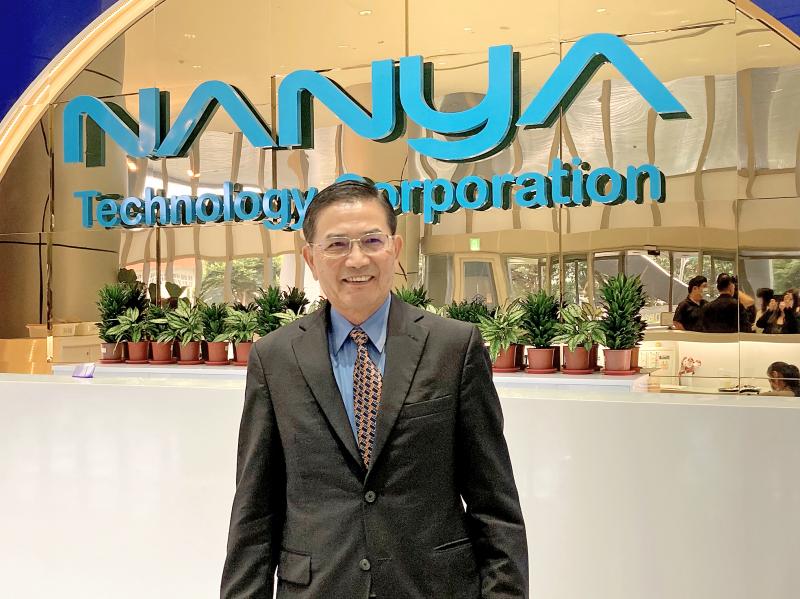DRAM chipmaker Nanya Technology Corp (南亞科技) yesterday said it would hold on to 30 percent of its overall capital expenditures earmarked for this year to use next year, given slackening market demand.
That would reduce the company’s spending on new facilities and equipment to about NT$10.7 billion (US$370.13 million) this year, instead of the NT$15.7 billion budgeted.
The move is in line with its bigger competitors’ conservative outlook about the memory industry.

Photo: Lisa Wang, Taipei Times
“That is primarily because of the overall [changes] in market situation,” Nanya Technology president Lee Pei-ing (李培瑛) told a media briefing at the company’s headquarters in New Taipei City’s Taishan District (泰山). “We have a conservative view of capital expenditures.”
However, the changes in capital spending would not affect its technological migration, Lee said.
Nanya Technology is on schedule to start pilot production of its 1A process technology this quarter, paving the way for revenue contribution from the technology at the end of next year, he said.
The chipmaker also expects the supply-demand situation to stabilize in the first half of next year, given limited supply growth and low inventories.
That would lead to a rebound in memorychip prices, it said.
As for the impact of Washington’s export restrictions on Huawei Technologies Co (華為), Lee said it should be rather short-lived given the Nanya’s broad customer portfolios and product lineup.
The firm supplies chips to more than 700 customers, he said.
The impact could last for two quarters, Lee said, echoing Micron Technology Inc’s recent comments on the loss of Huawei orders.
Other Chinese mobile phone makers would fill the void left by Huawei, he said.
Nanya Technology stopped shipping memory chips to Huawei as of Sept. 15 as the US restrictions took effect, and is waiting for the US government to approve it resuming shipments to Huawei.
As speculation swirled that Chinese memorychip maker Yangtze Memory Technology Corp (長江存儲) could be Washington’s next target, Lee said that such a move would not have much of an effect on his firm, given the Chinese company’s small market share.
Nanya also reported a contraction of 50 percent last quarter in net profit, to NT$1.61 billion, compared with NT$3.22 billion the previous quarter, and the lowest since the fourth quarter of last year.
Revenue was NT$15.32 billion, while its gross margin dipped to 25.9 percent last quarter from 30.6 percent in the second quarter.
The company attributed the weakness to a low single-digit percentage decline in average selling prices and shipments last quarter, as well as unfavorable foreign exchange rate and higher tax payments.
Nanya Technology expects sales of DRAM chips used in servers to drop mildly on a quarterly basis this quarter, while DRAM chips used in other applications such as laptops and mobile phones are forecast to pick up.

In Italy’s storied gold-making hubs, jewelers are reworking their designs to trim gold content as they race to blunt the effect of record prices and appeal to shoppers watching their budgets. Gold prices hit a record high on Thursday, surging near US$5,600 an ounce, more than double a year ago as geopolitical concerns and jitters over trade pushed investors toward the safe-haven asset. The rally is putting undue pressure on small artisans as they face mounting demands from customers, including international brands, to produce cheaper items, from signature pieces to wedding rings, according to interviews with four independent jewelers in Italy’s main

Japanese Prime Minister Sanae Takaichi has talked up the benefits of a weaker yen in a campaign speech, adopting a tone at odds with her finance ministry, which has refused to rule out any options to counter excessive foreign exchange volatility. Takaichi later softened her stance, saying she did not have a preference for the yen’s direction. “People say the weak yen is bad right now, but for export industries, it’s a major opportunity,” Takaichi said on Saturday at a rally for Liberal Democratic Party candidate Daishiro Yamagiwa in Kanagawa Prefecture ahead of a snap election on Sunday. “Whether it’s selling food or

CONCERNS: Tech companies investing in AI businesses that purchase their products have raised questions among investors that they are artificially propping up demand Nvidia Corp chief executive officer Jensen Huang (黃仁勳) on Saturday said that the company would be participating in OpenAI’s latest funding round, describing it as potentially “the largest investment we’ve ever made.” “We will invest a great deal of money,” Huang told reporters while visiting Taipei. “I believe in OpenAI. The work that they do is incredible. They’re one of the most consequential companies of our time.” Huang did not say exactly how much Nvidia might contribute, but described the investment as “huge.” “Let Sam announce how much he’s going to raise — it’s for him to decide,” Huang said, referring to OpenAI

The global server market is expected to grow 12.8 percent annually this year, with artificial intelligence (AI) servers projected to account for 16.5 percent, driven by continued investment in AI infrastructure by major cloud service providers (CSPs), market researcher TrendForce Corp (集邦科技) said yesterday. Global AI server shipments this year are expected to increase 28 percent year-on-year to more than 2.7 million units, driven by sustained demand from CSPs and government sovereign cloud projects, TrendForce analyst Frank Kung (龔明德) told the Taipei Times. Demand for GPU-based AI servers, including Nvidia Corp’s GB and Vera Rubin rack systems, is expected to remain high,